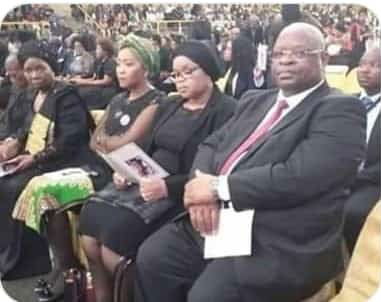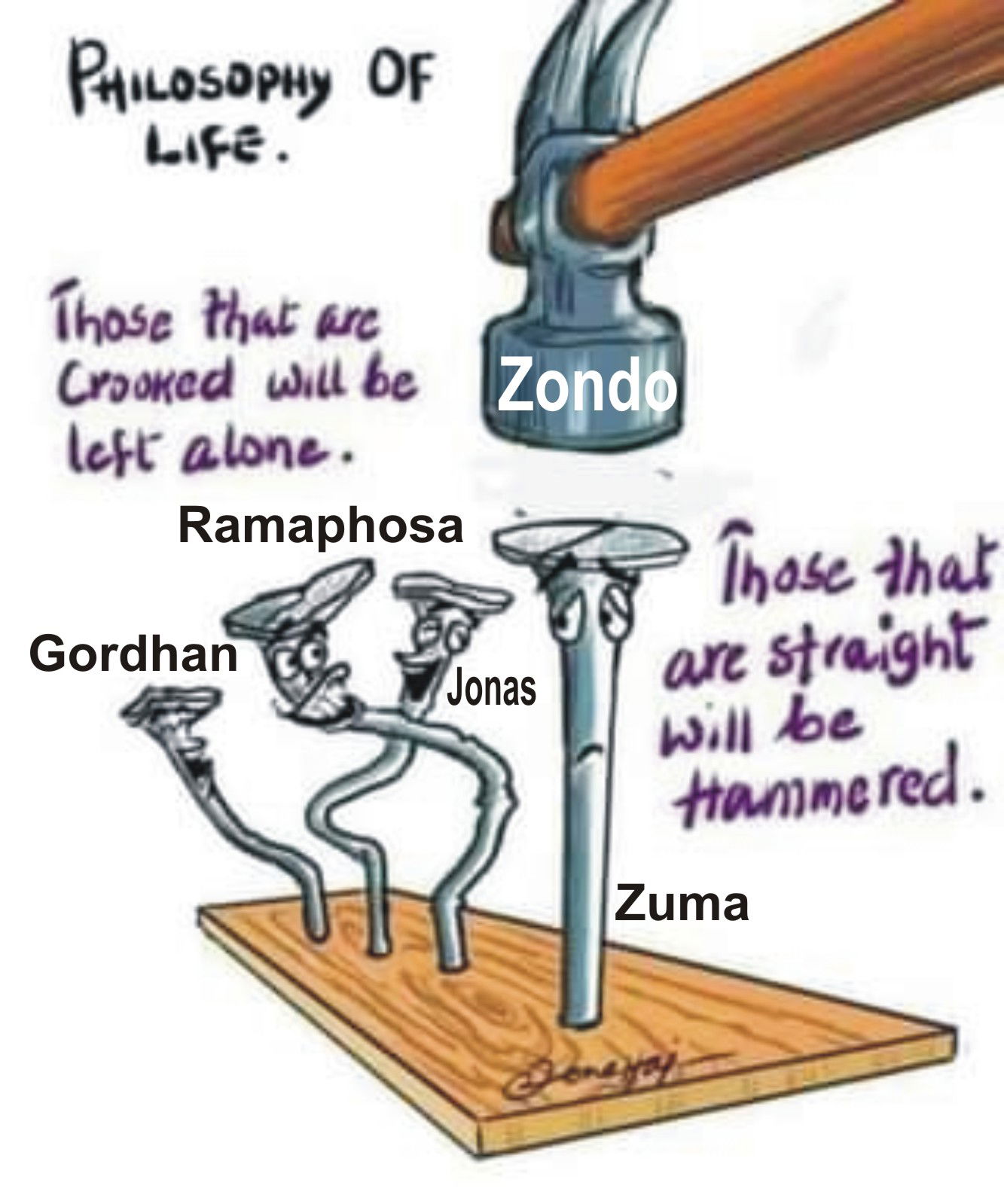Law expert rips Zondo’s conduct apart: Did DCJ Raymond Zondo really pass his Law Degree or he was blessed by the apartheid regime with it?
By Adv. Paul Ngobeni
When it rains it pours for DCJ Raymond Zondo at the State Capture Commission. It is a rule of almost universal application that a judge should disqualify himself in a proceeding in which his impartiality might reasonably be questioned, including but not limited to instances where:(a) he has a personal bias or prejudice concerning a party, or personal knowledge of disputed evidentiary facts concerning the proceeding…

Former President Jacob Zuma brought a recusal application in which he claimed that Zondo has a personal bias or prejudice. DCJ Zondo in his response disputed Zuma’s version of the facts, offered himself as a witness and then proceeded to adjudicate the very dispute in which he wore two hats as both a judge and a witness.
Zondo dismissed the recusal application and that prompted Zuma and his legal team to stage a walkout from the Zondo Commission with a promise of further litigation and possible judicial misconduct complaint against an obviously deflated DCJ Zondo.
How could Zondo, the number two judge in the apex court of this country so horribly miss the abecedarian (A novice learning the rudiments of some subject) concept that a judge cannot be, or cannot appear to be, impartial if he has personal knowledge of evidentiary facts that are in dispute?
It gets even worse if the judge offers himself as a witness and then proceeds to be a judge in his own case. That is unacceptable in our adversarial system where judges are required to decide cases on the evidence presented in court. If judges apply their own knowledge or do their own research they may deprive the parties of the chance to address that information with evidence and submissions. Judges who bring pre-conceptions to a trial may not appear, or be, impartial. They may pre-judge issues. Unfortunately that is where Zondo slipped up.

For quiet some time and based on his observations President Zuma has expressed his doubts about the lawfulness of the Zondo Commission, the biased manner in which it is being conducted and the fact that it has become a “slaughterhouse” and a forum in which all kinds of unsubstantiated and defamatory allegations have been made against him.
The first misstep by Judge Zondo was his acceptance of the appointment to serve in the State Capture Commission which has been running for three years now and has thus taken him away from his judicial duties. Zondo ignored the admonition of the Constitutional Court in South African Association of Personal Injury Lawyers v Heath and Others (CCT27/00) [2000] ZACC 22; 2001 (1) SA 883; 2001 (1) BCLR 77 (28 November 2000). There the Concourt quoted with approval Australian precedent which held that:
44.“it is not compatible with the holding of federal judicial office in Australia for such an office holder to become involved as ‘part of the criminal investigative process’, closely engaged in work that may be characterised as an adjunct to the investigatory and prosecutory functions. Such activities could ‘sap and undermine’ both the reality and the appearance of the independence of the judicature which is made up of the courts constituted by individual judges. They could impermissibly merge the judiciary and the other branches of government. The constitutional prohibition is expressed so that the executive may not borrow a federal judge to cloak actions proper to its own functions with the ‘neutral colours of judicial action’.[75]
The Court considered the fact that the functions that the head of the SIU (Heath) was required to perform were far removed from “the central mission of the judiciary.” They “are determined by the President, who formulates and can amend the allegations to be investigated. If regard is had to all the circumstances including the intrusive quality of the investigations that are carried out by the SIU, the inextricable link between the SIU as investigator and the SIU as litigator on behalf of the state, and the indefinite nature of the appointment which precludes the head of the unit from performing his judicial functions, the first respondent's position as head of the SIU is in my view incompatible with his judicial office and contrary to the separation of powers required by our Constitution.”
As shown below, President Ramaphosa has already amended the scope of the State Capture investigation and has involved Judge Zondo in the unenviable position of being part of the criminal investigative process in which witnesses testify before the Commission only to find themselves arrested by the Hawks a short while after giving such testimony.

Judge Zondo should also have heeded the following admonition of the Concourt in Heath: “Under our Constitution, the judiciary has a sensitive and crucial role to play in controlling the exercise of power and upholding the bill of rights. It is important that the judiciary be independent and that it be perceived to be independent. If it were to be held that this intrusion of a judge into the executive domain is permissible, the way would be open for judges to be appointed for indefinite terms to other executive posts, or to perform other executive functions, which are not appropriate to the “central mission of the judiciary.”
Were this to happen the public may well come to see the judiciary as being functionally associated with the executive and consequently unable to control the executive’s power with the detachment and independence required by the Constitution. This, in turn, would undermine the separation of powers and the independence of the judiciary, crucial for the proper discharge of functions assigned to the judiciary by our Constitution. “ Id. at para. 46.
To be fair to DCJ Zondo I am not arguing that he had any role in amending the Commission’s mandate. It appears that was a decision taken by the President alone. Unfortunately Ramaphosa thrust upon Zondo the unseemly burden of having the Commission, along with its retinue of investigators and evidence leaders, appear to be part of a criminal investigation process.
Unfortunately, Zondo overlooked the principle that judges must be, and be seen to be, separate from and independent of the legislature and executive. The blurring of this line has already occurred albeit through the intervention of President Ramaphosa who is yet to appear and to testify before the State Capture Commission. Records of donations from Ramaphosa’s own funders and bank records remain sealed by court order while Zondo is furiously investigating a faction of the ANC not congenial to Ramaphosa.
Secondly, Zondo’s dismissal of the well-founded recusal application will result in prolonged litigation in which legal clarity is sought on the overly broad mandate given to the Commission, lack of precise definition of “state capture” amongst other issues. The parallel judicial misconduct complaint against Zondo also creates a risk that his reputation may be sullied by these processes which he could have avoided.

Zondo’s flippant discussion of the evidence and comments he has directed at the impugned (Attack as false or wrong) conduct of former President Zuma make it clear that Zuma’s rights have been adversely affected in that he has been exposed to the risk that groundless allegations will be made against him in a manner injurious to his reputation. That is regrettable in that even Apartheid judges were solicitous of the rights of persons required to appear before a Commission of Inquiry. They ruled that a commission that pays scant regard to the rules of natural justice is not entitled to have its decisions respected by our courts or the executive.
Consider the case of S v Mulder (1980 1 SA 113 (T) 121F-121G) where a comparable situation arose under the Commissions Act 8 of 1947 in the so-called Erasmus Inquiry conducted in the late 1970s. The previous apartheid Minister, Dr Connie Mulder, had been summoned to appear before the one man commission.
It was revealed that Mulder, along with Prime Minister Vorster, had planned to use defence force funds to stage an apartheid propaganda campaign. This plan included offering bribes to international news agencies and purchasing a Washington newspaper.
Vorster also misappropriated funds by financing The Citizen, the only English newspaper supportive of the NP and their apartheid policy. On advice of his counsel, Johann Kriegler SC, Mulder declined to testify. He was charged with declining to testify in terms of the Commissions Act. The Transvaal Supreme Court quashed the conviction of Mulder on the ground that the mandate of the Commission was so widely and vaguely defined that he was legally justified in declining to testify. In effect, the summons to testify was held to have been invalid in the light of the mandate given to the Commission.

The court also agreed that the due process rights of citizens deserved to be safeguarded during commissions of inquiry and that the recommendations of a commission of inquiry may in “in los sin“ (“in a loose sense”) have an adverse effect on citizens. Please note the hypocrisy of the same Kriegler who has been attacking President Zuma and has hidden the fact that he previously advised an apartheid minister to refuse to participate in a Commission where his rights were being violated.
As Vuyani Ngalwana SC neatly summarizes it, the Constitutional Court also emphasized certain relevant principles in Magidiwana and Others v President of the Republic of South Africa and Others 2013 (11) BCLR 1251 (CC), where it stated that (1) the purpose of a Commission of Inquiry [a search for the truth, accountability and transparency, inform corrective measures and influence future policy]; (2) the person who has the power to appoint it [the President]; (3) the source of that power [the Constitution]; and (4) at least one factor that may compromise “the search for truth and the purpose of the Commission” [unfairness]. Unfortunately DCJ Zondo is vulnerable on all of these factors.
Frankly, I do not expect sanity and principled legal reasoning to prevail in this anti-Zuma atmosphere saturated with hatred and malevolence towards the former president. Zondo’s refusal to recuse himself from the Zondo Commission ups the ante and squarely puts the ball in Zuma’s court – he can, just like Connie Mulder, refuse to participate or comply with the subpoena citing the unlawful establishment of the Commission by the judiciary, the unwieldy overly broad mandate given to the Commission , the obviously biased manner in which Zondo has conducted himself.

Even worse, the intervention of President Ramaphosa who changed the rules to allow the State Capture Commission to be used as a “Trojan horse” to ensnare the unwary (Not alert to danger or deception) will surely have far-reaching legal ramifications. In the alternative, Zuma can review and set aside the adverse decision on the recusal application. That may be the best available option even though it would have been ideal to wait until the conclusion of the entire State Capture Commission.
Third, a disturbing meddling by President Ramaphosa in the work of the State Capture Commission has also raised the specter that the Zondo Commission is hopelessly compromised and is transformed into an instrument to fight factional battles within the ANC. Following loud criticism of the NPA for its alleged failure to prosecute high profile state capture cases, Ramaphosa amended the Commission’s regulations to allow the Zondo Commission to be used as a Trojan horse for the unwary (the ignorant).

In November 2019, NDPP Shamila Batohi said while there was good cooperation with the inquiry chaired by DCJ Zondo, accessing information was difficult. She stated: “The Zondo commission cannot share [information] with us unless it has been made public or if the chairperson has otherwise authorised the release of information, and obviously there’s an unwillingness to do that because there’s much to be gained from people coming forward and giving evidence. We are in dialogue on how to manage challenges on both sides of the fence”.
In response to the importuning of the NPA Ramaphosa published in a gazette notice of 28 July 2020 an amendment which effectively allows South Africa’s law enforcement agencies to have access to information gathered by the state capture commission of inquiry, making it easier to build cases against implicated individuals.
The gazette notice introduces sub-regulation 5 in regulation 11 which reads, “Sub-regulation (1) (2) and (3) shall not apply to the sharing of information, records or documents with any state law enforcement agency.” This raises very serious questions about whether Ramaphosa has effectively forced DCJ Zondo to operate as an appendage to the NPA’s criminal prosecution and investigations which appears to be unlawful and unconstitutional.

The pivotal question is whether changing the rules more than two years after the Zondo Commission has commenced its investigations poses a threat to the fairness of the process, unfairly prejudices the rights of implicated persons and threaten to undermine the legitimacy of the Zondo Commission itself.
Persons have already given and completed evidence under the rules as they existed and implicated persons were under the impression that the investigators and members employed by the Commission would operate professionally and not labour under a conflict of interest. That changed as the SIU has now used the very information given to the Zondo Commission to arrest persons implicated in corruption and other offences.
The absolute independence of the Commission should have been preserved and Zondo should have been its most vigilant custodian. But he failed. Admittedly, a commission of inquiry is not a court of law. It does not have the power to prosecute or convict any person – that power belongs to the National Prosecuting Authority (NPA).
The procedural rules that apply in criminal cases are also not applicable and witnesses or implicated people do not enjoy the same procedural rights as does an accused person in a criminal trial. While a commission may establish wrongdoing or misconduct, it does not find anyone guilty of a crime, nor does it establish civil liability for monetary damages.

The President’s changing of the regulations has blurred the line and Zondo cannot now be seen to be separate from and independent of the NPA and the executive. There is a greater risk that some of the criminal suspects arrested in such underhanded processes may successfully fight the NPA in court. Persons summonsed to appear before Zondo may now justifiably invoke the privilege against self-incrimination and completely refuse to testify.
I have surveyed case law on commissions of inquiry from a number of common law countries (former British colonies) with a legal system similar to ours. There is almost universal recognition that Commissions are not courts of law and evidence adduced during a commission’s inquiry is not automatically admissible in civil or criminal proceedings. In New Zealand the judiciary has long made it pellucid that commissions of inquiries are not courts of law, nor administrative tribunals. See, for example, Peters v Davison [1999] 2 NZLR 164, 181 (CA). Such Commissions do not have the power of determination, and their recommendations and findings bind no one. They can be ignored or rejected by the executive willy-nilly.
The Davison Court cited In Re the Royal Commission to Inquire into and Report upon State Services in New Zealand [1962] NZLR 96 at p 109 where North J said: ''A Commission of Inquiry is certainly not a Court of law. . . . Nor is a Commission of Inquiry to be likened to an administrative tribunal entrusted with the duty of deciding questions between parties. There is nothing approaching a lis, a Commission has no general power of adjudication, it determines nobody's rights, its report is binding on no one.''
The Davison court also made the following observation:
“In opposition are basic characteristics of a commission of inquiry. Its report is merely an expression of its opinion. A commission of inquiry is not to be likened to a Court of law nor to an administrative tribunal entrusted with the duty of deciding questions between parties; there is nothing approaching a lis and the commission has no general power of adjudication (North J in Re the Royal Commission to Inquire into and Report upon State Services in New Zealand at p 109). It follows that the reports of commissions of inquiry have no immediate legal effect. Because the reports of commissions of inquiry are, in the end, only expressions of opinion, "[i]n themselves they do not alter the legal rights of the persons to whom they refer"
The Davison court poignantly observed that “…inquiries, especially into alleged wrongdoing, generally excite public and media attention. Their reports similarly receive major publicity. Whatever the technical legal characterisation might be, the public interest in this unusual, serious, official process plainly calls for carefully prepared and applied rules of law designed both to produce a report of real value and to protect the rights and interests of those involved. That can be seen in the legislation under which commissions operate and the reforms which have been introduced over recent decades.”
In sharp contradistinction to the lax approach of DCJ Zondo, the Davison Court was emphatic that a commission did not have a licence to commit legal errors or to willy-nilly trash the reputation of individuals during an inquiry. If that happens the judiciary is not powerless - it has the power to intervene. As the court put it:
An alleged error of law made by a commission of inquiry in its report which materially affects a matter of substance relating to a finding on one of the terms of reference is in general reviewable by Court proceedings. The reason for exercising that power of review is the stronger if that error damages the reputation of any person directly concerned in the inquiry.

The Davison court also made it clear that commission reports affecting individuals’ reputation must be scrutinized by the judiciary to ensure that any criticism is made upon a proper legal basis. The court stated:
...[i]n some situations condemnation of a person in a commission report will be scarcely distinguishable in the public mind from condemnation by a Court of law ... Where a report calls a person's reputation into question in a direct way, both that person and the public generally have an interest in ensuring that any criticism is made upon a proper legal basis. It would be contrary to the public interest if the Courts were not prepared to protect the right to reputation in such a context.

The Court, in another New Zealand case, Re Erebus Royal Commission (No 2) [1981] 1 NZLR 618, agreed with the applicants and considered the reputational element to be very significant in dealing with challenge to a Commission report.
The Court was satisfied that the findings were collateral assessments of conduct made outside of the terms of reference. In doing so, a distinction was drawn between allegations of perjury and allegations of organized perjury. While it was within the scope of the Commissioner’s jurisdiction to consider whether individual witnesses committed perjury, in alleging a conspiracy to perjure the Commissioner went beyond his jurisdiction.
While an inquiry is authorized to do those things which are reasonably incidental to carrying out its functions, the Court did not believe that the powers went so far as to permit allegations of a conspiracy to perjure. Otherwise, “by mere implication any Commission of Inquiry, whatever its membership, would have authority publicly to condemn a group of citizens of a major crime without the safeguards that invariably go with express powers of condemnation”.[1][1]

In the course of rendering its judgment the court made important observations as follows:
''This is not an appeal. Parties to hearings by Commissions of Inquiry have no rights of appeal against the reports. The reason is partly that the reports are, in a sense, inevitably inconclusive. Findings made by Commissioners are in the end only expressions of opinion. They would not even be admissible in evidence in legal proceedings as to the cause of a disaster. In themselves they do not alter the legal rights of the persons to whom they refer.
Nevertheless they may greatly influence public and Government opinion and have a devastating effect on personal reputations; and in our judgment these are the major reasons why in appropriate proceedings the Courts must be ready if necessary, in relation to Commissions of Inquiry just as to other public bodies and officials, to ensure that they keep within the limits of their lawful powers and comply with any applicable rules of natural justice.''

In Erebus, Woodhouse P and McMullin J made their comments about reputation in rebutting the argument that the report was not the exercise of a statutory power of decision, in terms of not "affecting" the rights of a person under the Judicature Amendment Act 1972 and was accordingly not reviewable under that Act. As both judges succinctly put it:
''We think it would be very difficult to justify an argument that findings likely to affect individuals in their personal civil rights or to expose them to prosecution under the criminal law are not decisions 'affecting' their rights within the meaning of the Act. In the present case, for example, it was virtually certain that the findings of the Erebus Commission would be published by the Government.
The effect on the reputation of persons found guilty of the misconduct described in the Report was likely to be devastating. At common law every citizen has a right not to be defamed without justification. Severe criticism by a public officer made after a public inquiry and inevitably accompanied by the widest publicity affects that right especially when the officer has judicial status and none the less because he has judicial immunity"
Canadian courts have also accepted the well-established principle that a Commission of Inquiry may not draw conclusions, or make recommendations regarding the civil or criminal responsibility of any person or organization. They are generally prohibited from making any findings of criminal or civil responsibility, and no such finding may be inferred from any of a Commissioner’s remarks.
Such a prohibition is necessary because a commission may admit evidence not given under oath, and the ordinary rules of evidence which provide protection against such matters as hearsay do not apply to public inquiries. Justice Cory of the Canadian Supreme Court in Canada (Attorney General) v. Canada (Commission of lnquiry on the Blood System) (1997), 151 D.L.R. (4th) 1, said the following about the history, nature and role of inquiry commissions in that country:
29 Commissions of inquiry have a long history in Canada, and have become a significant and useful part of our tradition. They have frequently played a key role in the investigation of tragedies and made a great many helpful recommendations aimed at rectifying dangerous situations.
34 A commission of inquiry is neither a criminal trial nor a civil action for the determination of liability. It cannot establish either criminal culpability or civil responsibility for damages. Rather, an inquiry is an investigation into an issue, event or series of events. The findings of a commissioner relating to that investigation are simply findings of fact and statements of opinion reached by the commissioner at the end of the inquiry.
They are unconnected to normal legal criteria. They are based upon and flow from a procedure which is not bound by the evidentiary or procedural rules of a courtroom.
There are no legal consequences attached to the determinations of a commissioner. They are not enforceable and do not bind courts considering the same subject matter. ... Thus, although the findings of a commissioner may affect public opinion, they cannot have either penal or civil consequences. To put it another way, even if a commissioner’s findings could possibly be seen as determinations of responsibility by members of the public, they are not and cannot be findings of civil or criminal responsibility.
Very interesting insights are contained in the judgments in the High Court and in the Supreme Court of Ireland in the leading case of Goodman International and Lawrence Goodman v. The Honourable Mr. Justice Liam Hamilton, Ireland and the Attorney General [1992] 2 IR 542. This decision is now the foundation, in Irish law, of the constitutionality of the Tribunal of Inquiry, as known in Irish law. In Goodman, the former Chief Justice said at p.590:
“With regard to the suggestion that the findings of the Tribunal if not an impermissible administration of justice by a body other than a court, is a usurpation of the activities of courts in cases where either civil cases are pending or may be instituted, it seems to me that again this submission arises from a total misunderstanding of the function of the Tribunal.
A finding by this Tribunal, either of the truth or of the falsity of any particular allegation which may be the subject matter of existing or potential litigation, forms no part of the material which a court which has to decide that litigation could rely upon. It cannot either be used as a weapon of attack or defence by a litigant who in relation to the same matter is disputing with another party rights arising from some allegation of breach of contract or illegal conduct or malpractice. I am, therefore, satisfied that the submission under Article 34 must fail”. (Emphasis added)
When all is said and done, the Zondo Commission may not prove to be such a big or transformative event in the country’s fight against corruption. Upon closer scrutiny of the functions of Commissions of Inquiry they all seem to have several things in common - such tribunals operate “in vacuo” (In isolation and without reference to anything else) and are “sterile of legal effect” in that their reports are simply opinions and “devoid of legal consequences”.

If the report could be used, on a prima facie basis or otherwise, as a weapon or a shield in the hands of a litigant it would manifestly not be “devoid of legal consequences” or “sterile of legal effect” and would thus improperly assume the status of a court judgment.
A matter of fact requiring to be established before a court must be established by admissible evidence which is open to cross-examination and contradiction, and is given publicly before the Court. It is not normally an admissible form of proof to produce a statement by a third party whether a policeman, a government minister or a Tribunal of Inquiry and to claim that that has evidential effect, prima facie or otherwise.
An exception to this arises, of course, where there is an issue which, by virtue of a decision of a court of competent jurisdiction, is res judicata (A matter already settled in court; cannot be raised again) between the parties; but such a decision of a court will itself have been reached on admissible evidence duly adduced in a hearing which observes all the parties’ procedural rights.
Unfortunately, Zondo has been extremely stingy in allowing cross-examinations and his suggested methods of deciding matters on affidavit evidence leave much to be desired. In the next installment I shall examine specific instances in which Zondo manifested undeniable bias and where he stopped searching for the truth and went after Zuma instead.
